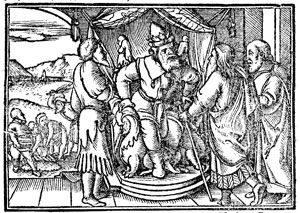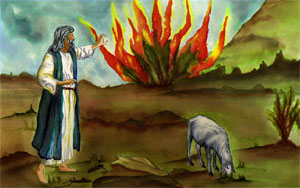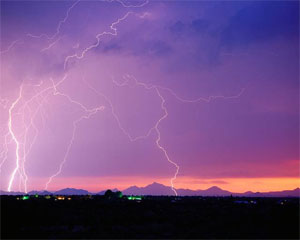Making and Keeping Promises
Guest essay by Sam Rowen (PhD, Michigan State). Sam has spent his adult life in international ministries, most recently in theological education in Asia. Now retired, he continues his work in international theological education and serves as an assistant pastor in Cape Coral, Florida.
For Sunday August 28, 2005
Lectionary Readings (Revised Common Lectionary, Year A)
Exodus 3:1–15 or Jeremiah 15:15–21
Psalm 105:1–6, 23–26, 45c or Psalm 26:1–8
Romans 12:9–21
Matthew 16:21–18
 |
Moses and Aaron before Pharoah.* |
When young men in Great Britain did not live up to the expectations of their family, they were shipped off to one of the colonies in order to “grow up." For this reason, when Austin Coates was not doing well at university, his family shipped him to Hong Kong. Austin, mind you, is the son of a famous English composer, Sir Kenneth Coates.
Upon arriving in Hong Kong Austin decided not to get into a civil service job immediately. He looked around and made sure that he had plenty of time to party. He was slated to become a magistrate, but there were two different sets of rules for being a magistrate—one following British law and one following Chinese law. Convinced that he could never pass the British examination, he decided to become a magistrate handling cases according to Chinese patterns.
He tells this story in an amusing book called Myself, a Mandarin. It took Coates quite a while to do things the Chinese way. He recalls an instance with his butler in which he could not directly tell him how to cook his bacon. Coates had to get a friend of the butler to send the message. In reflecting on this experience he learned something about the Chinese mind.
 |
Meaning between the words. |
He quotes an old proverb which says, “No one fills a wine glass full, otherwise he will spill it and waste the wine.” In Chinese negotiations 90% agreement is a full agreement. If you push past this point you become a boor. You spill and waste the wine. Beyond the 90% agreement everything depends upon the person who promises. There is meaning between the words. These linguistic interstices must be understood in order to have meaningful communication. The Chinese written language, made up of picture characters, allows for openness to meaning which is not in Western languages without using a large number of words.
When we lived in Hong Kong my son was given a Chinese name which means “cloud.” His friends thought this was a good name because he had traveled in many different parts of the world. A cloud floats above the earth and has a perspective on life which is beyond one’s experience. An elderly Chinese Christian lady, on the other hand, was horrified that we would give our son such a name. She commented that with the name of “cloud” it means that he would never find peace in life, but would constantly be on the move. Just as two people can look at the same picture and arrive at different meanings, so it is hard to define things with a precision to satisfy different people. In relationship with God it is easy not to comprehend sufficiently enough to feel comfortable. Everything depends on the character of this One who makes the promises to fill in the empty spaces we constantly experience.
 |
Moses and the Burning Bush. |
The story of the burning bush in Exodus 3 brings us face-to-face with this God who has made promises. Moses did not understand everything. He was confronted with a phenomenal experience of a bush which burned but was not consumed. From the bush came the voice of God. Moses didn't understand and asked who he was. God revealed himself to Moses as YHWH—I Am that I Am. This is the name of the God of the covenant promise. The God of the covenant builds his relationship with people on the basis of his faithfulness in keeping his promises. This YHWH, Moses was to learn, made promises and kept promises.
Moses soon got some directions on what God wanted him to do. He was told to go back to Egypt, the very place of Israel's oppression and enslavement, and confront the powerful Pharaoh with the demand to set God’s people free. Moses hesitated. That angered the Lord because Moses was expected to be obedient, because the promises made by God would be kept by God—He would provide everything necessary for the task to which he called Moses. Could Moses expect God to keep his promises? It was frightening to contemplate standing before Pharaoh. How secure could Moses feel during this critical time?
A recent movie What the #$*! Do We (K)now!? explores the age old question of what is real and how do we know it. In what is presented as a documentary, people ranging from physicists to New Age practitioners address the issue. Is "reality" primarily a matter of inner human consciousness that we project, or is there some independent, external reality which we can know? During the time of the Reformation there was a debate over the words securitas and certitudo (security and certainty). Security depends on guarantees and certainty depends on promises. The conclusion was that God has not given his people security, but he has given them certainty.
 |
The Heavens Declare the Glory of God. |
Moses did not feel secure in the task God gave him. However, he slowly came to a state of certainty that YHWH who made promises would prove faithful to keep his promises. In light of all of Moses's objections, he only had to lift his eyes and find the faithfulness of God in the person of Aaron who was walking down the path. Moses then gained the certainty that walking in obedience to God rested on the character of the God who makes and keeps promises.
The tendency to domesticate God is always a temptation. To walk with God requires the faith to realize that “the secret things belong to the LORD our God, but the things that are revealed belong to us and to our children forever, that we may do all the words of this law” (Deuteronomy 29:29). In a society controlled by warranties, we are best offered a replacement of the broken part. With promises we live with a hope that will one day be fully realized. In our futile attempts to control our lives we can find assurance in the words of Tennyson (1849):
Our little systems have their day,
They have their day and cease to be;
They are but broken lights of thee,
And thou O God are more than they.
Living without securities can prove unsettling, but we do so with the certainty that the God who makes promises also keeps them.
* Courtesy of the Digital Image Archive, Pitts Theology Library, Candler School of Theology, Emory University.





